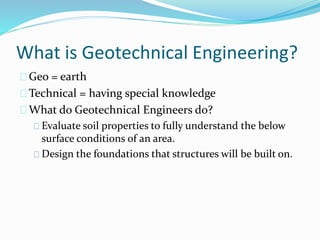Geotheta Fundamentals Explained
Wiki Article
Our Geotheta Ideas
Table of ContentsGetting My Geotheta To WorkThe 15-Second Trick For GeothetaSome Known Details About Geotheta Our Geotheta IdeasGeotheta - An Overview

They carry out website examinations, accumulate samples, perform research laboratory examinations, and examine data to examine the viability of the ground for construction projects - Tailings Engineer. Based on their searchings for, geotechnical designers give recommendations for foundation layout, incline security, maintaining frameworks, and reduction of geotechnical threats. They collaborate with various other specialists, such as engineers, structural engineers, and construction groups, to make certain that geotechnical factors to consider are integrated into the overall job style and application
By assessing the actions and residential properties of dirt and rock, they can determine possible geotechnical threats such as landslides, dirt settlement, or slope instability. Their expertise helps prevent failings or accidents that can jeopardize lives and building. Right here are some detailed tasks and obligations of a geotechnical designer: Site Examination: Geotechnical designers conduct website examinations to collect information on subsurface problems.
They interpret the data to comprehend the residential or commercial properties and actions of the dirt and rock, including their strength, permeability, compaction attributes, and groundwater problems. Geotechnical Evaluation and Style: Geotechnical engineers examine the data accumulated throughout website investigations to examine the stability and suitability of the website for building tasks. They perform geotechnical calculations and modeling to evaluate variables such as birthing capability, settlement, incline security, lateral planet pressures, and groundwater flow.
The Geotheta Diaries
Structure Design: Geotechnical designers play an essential function in making foundations that can securely support the desired structure. They evaluate the dirt problems and lots demands to establish the suitable structure type, such as superficial structures (e.g., grounds), deep foundations (e.g (https://www.easel.ly/browserEasel/14498559)., heaps), or specialized methods like soil improvement. They take into consideration variables such as negotiation restrictions, bearing capability, and soil-structure interaction to create optimal foundation designsThey examine building strategies, monitor website activities, and carry out area assessments to validate that the design referrals are followed. If unpredicted geotechnical problems arise, they analyze the circumstance and supply recommendations for removal or changes to the style. Risk Assessment and Reduction: Geotechnical designers evaluate geotechnical threats and dangers connected with the project website, such as landslides, liquefaction, or soil erosion.

Partnership and Interaction: Geotechnical engineers function closely with various other specialists included in a task, such as architects, structural engineers, and building and construction teams. Efficient communication and cooperation are necessary to integrate geotechnical considerations right into the overall job layout and building process. Geotechnical designers give technical proficiency, solution inquiries, and ensure that geotechnical requirements are satisfied.
What Does Geotheta Mean?
Below are some sorts of geotechnical engineers: Foundation Designer: Foundation designers focus on designing and evaluating structures for structures. They assess the dirt problems, tons demands, and website qualities to determine one of the most appropriate structure kind and layout, such as shallow structures, deep structures, or specialized strategies like stack structures.They evaluate the aspects affecting slope stability, such as dirt homes, groundwater conditions, and slope geometry, and create techniques to avoid incline failures and minimize dangers. Earthquake Designer: Earthquake engineers focus on assessing and developing structures to withstand seismic pressures. They evaluate the seismic risk of a website, evaluate soil liquefaction capacity, and establish seismic style requirements to make sure the safety and security and durability of frameworks throughout quakes.
They carry out area screening, accumulate examples, and examine the gathered data to characterize the soil residential properties, geologic formations, and groundwater problems at a website. Geotechnical Instrumentation Designer: Geotechnical instrumentation engineers focus on surveillance and measuring the habits of dirt, rock, and structures. They install and maintain instrumentation systems that keep track of aspects such as dirt negotiation, groundwater levels, slope movements, and structural displacements to examine efficiency and offer early warnings of prospective concerns.
The Main Principles Of Geotheta
They conduct examinations such as triaxial examinations, combination examinations, direct shear examinations, and permeability examinations to collect information for geotechnical analysis and design. Geosynthetics Designer: Geosynthetics designers concentrate on the design and application of geosynthetic materials, such as geotextiles, geogrids, and geomembranes. They utilize these products to enhance soil stability, reinforce slopes, provide drainage solutions, and control erosion.They have a tendency to be investigatory people, which means they're intellectual, introspective, and analytical. They are curious, methodical, logical, analytical, and logical. Some of them are likewise social, implying they're kind, charitable, cooperative, person, caring, useful, compassionate, skillful, and friendly - Consulting Engineers.
In the office environment, geotechnical engineers make use of specialized software devices to execute calculations, produce designs, and evaluate information. They prepare reports, testimonial project specs, connect with customers and group participants, and coordinate task activities. The workplace setup gives a helpful atmosphere for research, evaluation, and partnership with other professionals associated with the task.
How Geotheta can Save You Time, Stress, and Money.
They regularly go to project websites to perform site investigations, assess geotechnical problems, and gather information for analysis. These brows through involve taking a trip to various locations, often in remote or challenging terrains. Geotechnical engineers might perform soil tasting, conduct examinations, and monitor building activities to make certain that the geotechnical aspects of the job are being implemented properly.Geotechnical designers additionally function in specialized geotechnical laboratories. In these facilities, they conduct experiments, do examinations on soil and rock samples, and assess the design homes of the materials. Geotechnical lab engineers work extensively in these settings, dealing with testing equipment, operating tools, and videotaping information. They team up with various other research laboratory team to ensure accurate and trustworthy screening outcomes.
Report this wiki page